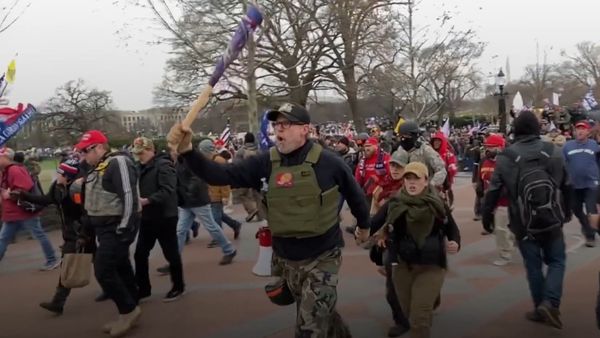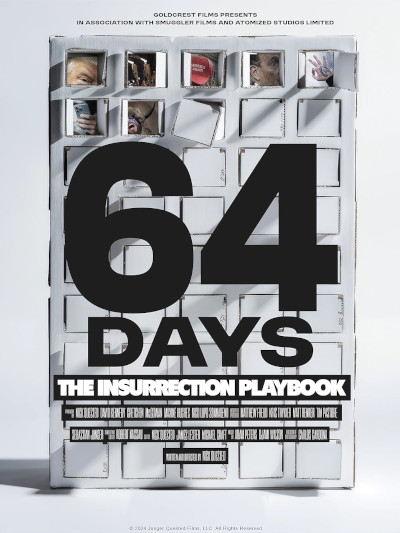Eye For Film >> Movies >> 64 Days (2024) Film Review
64 Days
Reviewed by: Jennie Kermode

Released shortly before the advent of voting in the 2024 US presidential election, this documentary by Nick Quested could not be more timely. There have already been a number of works examining the assault on the country’s Capitol building on 6 January 2021, but beyond its shock value, that isn’t much of a story in itself. The most interesting part of any battle is almost always what happens in the run-up to it. As discussions go on quite openly about what people on the extreme right might do if Donald Trump loses on 4 November, it’s valuable to explore the way that those discussions unfolded last time around, and what happened in the 64 days between the election and the insurrection.
The film opens with footage of the Select Commitee Inquiry into the events of that day, at which Quested testified: he presents it as an extension or summation of that testimony. “2020 forced me to look at America through the same lens I’d used to look at countries around the world,” he says, and viewers familiar with his work will think of the likes of Restrepo, Pussy Riot: A Punk Prayer and Hell On Earth: The Fall Of Syria And The Rise Of ISIS. His contribution to the Inquiry is pertinent because in the run-up to the 2020 election he was embedded with the Proud Boys, close to their chair Enrique Tarrio, and therefore privy to a lot of their planning. The casual way in which they spoke and behaved in front of him suggests not only a difficulty in believing that somebody they got along with could fail to be won over to their cause, but also a sense of impunity, a confidence that their side would win and therefore they would never face justice.

It was a little subtler at the outset. Quested traces the Stop the Steal project back to Maricopa County, Arizona, endeavouring to map out the key individuals involved, which is not easy in light of how fast the whole thing ballooned. Despite claims that the movement arose spontaneously in response to what was perceived by many as a false election declaration, anybody who knows the least thing about organising people could see that it had deeper roots, and Quested convincingly maps out the role of Facebook groups pushing what he calls ‘coded’ incitement to violence: essentially posts designed to make people feel angry or cheated. He highlights the Friends of Stone group chat with extremist leaders drawn together by Roger Stone, who, he argues, was probably talking with Trump as this network developed.
We see the results of this type of rhetoric in footage of demonstrations and street clashes. The framing of these is a little leading – for instance, an interview with a solo woman representing part of the multifarious anti-fascist movement is followed by footage of a sizeable mob of aggressive men shouting “Fuck Antifa!” – but the Proud Boys’ violence speaks for itself. In one particularly distressing scene, a couple walking down the street are attacked by a mob, a man beaten whilst his girlfriend pleads for his assailants to stop and is repeatedly shoved out of the way. in another clip, a Black Lives Matter campaigner participating in a march is punched full in the face and then kicked by multiple men whilst he lies on the ground.
How is the movement financed? Clips of Alex Jones praising such attacks are a reminder that some people make a good deal of money off it. With Jones, we are told, it’s herbal supplements, advertised alongside such messages. Other merchandisers show us hats, books and pillows with ‘Stop the Steal’ or ‘MAGA’ or related messages printed on them. There are shirts, badges, stickers, iPhone cases, lego ‘build the wall’ bags (which one imagines the Danish toymaker would not be too happy about). These help to finance the online propaganda and also lawsuits filed without the expectation of victory but rather as a means of sowing distrust in the organs of the state. One interviewee compares them to techniques used in the Salem witch trials – how exactly is one supposed to prove that one is not an election rigger?
There are a number of scenes reflecting on how election officials – including registered Republicans who simply prioritised their commitment to the democratic process – were bullied and threatened in the weeks following the election. The psychological impact of this would be sufficient to support a documentary in itself. How exactly does one balance a belief that the constitution was divinely inspired, that it is one’s religious duty to abide by it, with threats against one’s children?
Most people, of course, won’t participate in this kind of intimidation unless they have stopped thinking of their targets as human, and so there is some reflection on the distancing effect of social media, though one might also argue that it’s simply a product of the US being an unfeasibly large entity – that people don’t have enough familial and community bonds to truly feel like one nation. This is familiar territory for Civil War historians, and it’s interesting to see the parallels between the rhetoric which preceded the Confederacy ‘s attempt to secede and what is at work here – not least when we are looking across the Potomac amid fantasies of what victory might bring.
Like that movement, much of the plotters’ work seems curiously detached from reality. They know how to build up discontent, but not how to make use of it in any strategically practical way. Documentary evidence of a plan to occupy key buildings in Washington DC leaves one wondering just how they would have reacted when the apparatus of government simply moved to other buildings and the world carried on as before. The Trump loyalists crashing into the Capitol building seem every bit as lost – and as mistreated by their own side – as Robert E Lee’s troops in their last valiant and stupid charge at Gettysburg. They’re dangerous but only in an animal way, their actions those of last resort. Their dream of victory through force seems hopelessly out of date.
Why is it still such an easy sell? Religion is clearly part of it, and there is some musing on this, but not much, with Quested’s focus being on more tangible things. He touches on the bizarre conspiracy theories which have similar function for some of them. Propaganda which is, in a very real sense, Medieval – certainly pre-Enlightenment – transmutes the frustrations of late stage capitalism into a longing for a sense of purpose, of glorious destiny. In the end, it’s just a lot of people running about and shouting, making themselves and others miserable, whilst the middle management layer is shocked to encounter consequences; and those with real power are left largely untouched, but for their own sense of tragedy at not having more of it.
Reviewed on: 20 Oct 2024If you like this, try:
Day Of Rage: How Trump Supporters Took The US CapitolGod And Country
A Storm Foretold
















